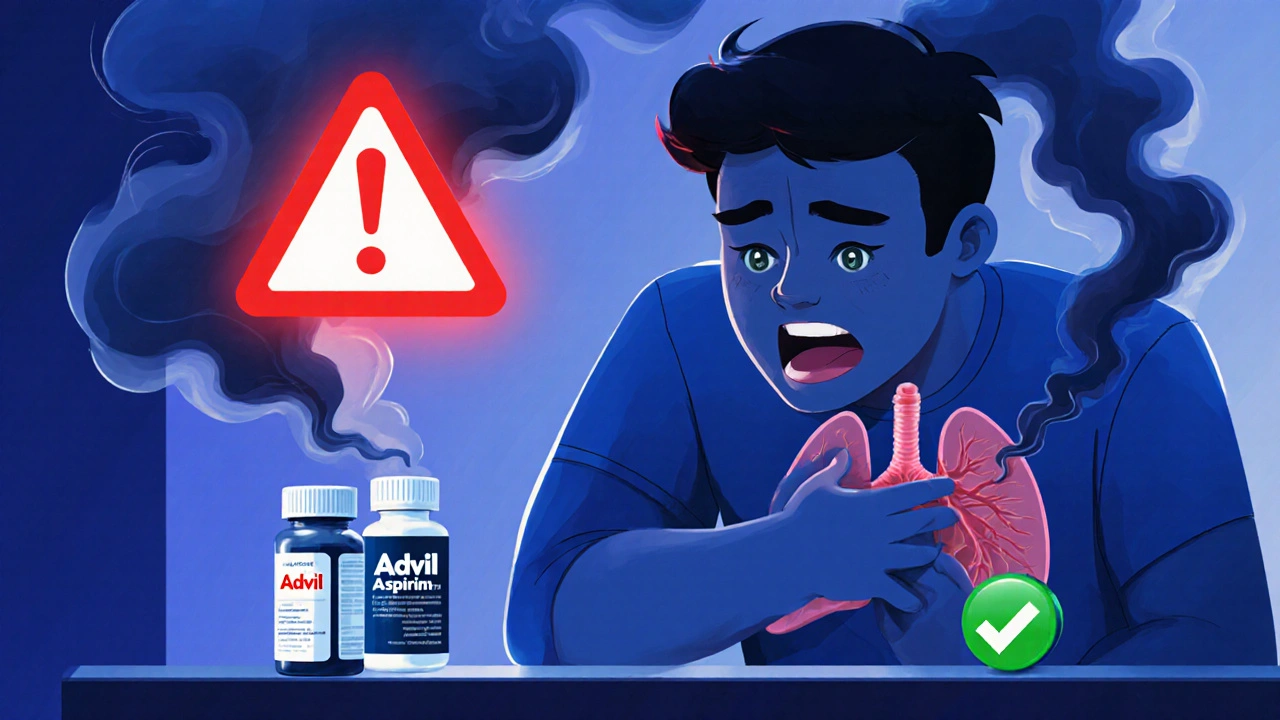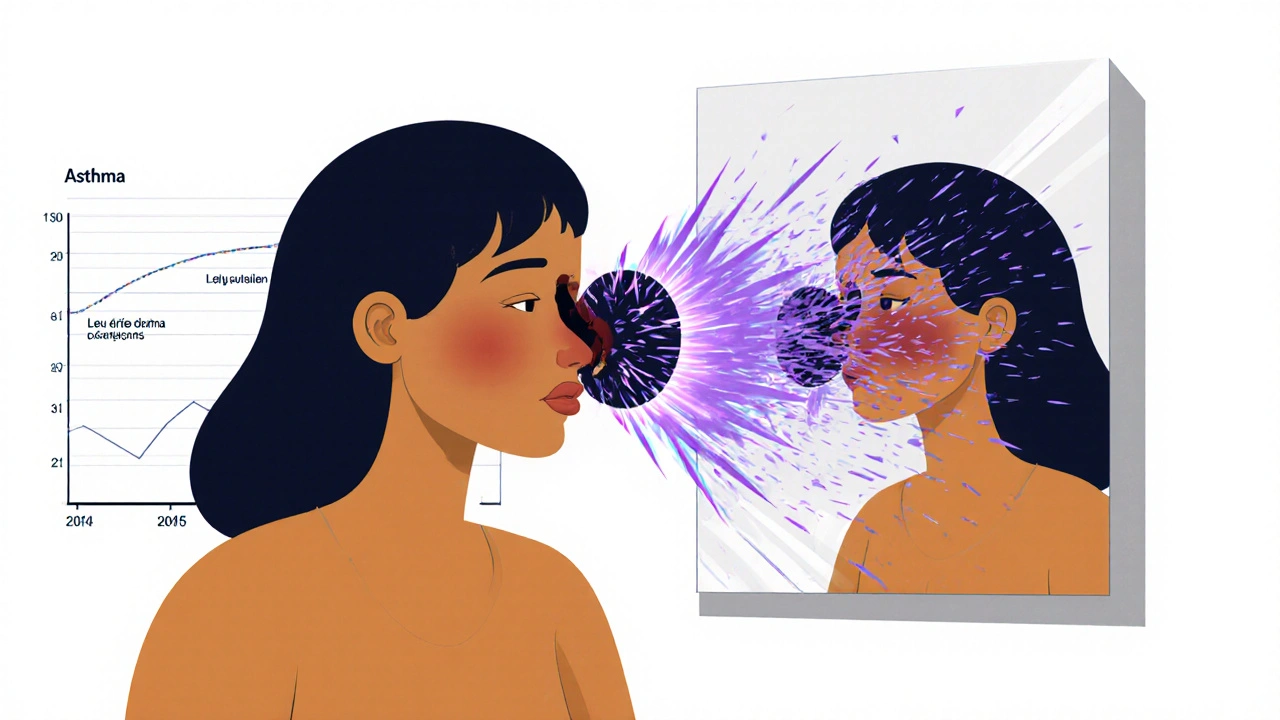
If you have asthma and reach for an over-the-counter painkiller like ibuprofen or aspirin for a headache, you could be risking a serious reaction-without even knowing it. This isn’t just a rare side effect. It’s a well-documented condition called NSAID-Exacerbated Respiratory Disease (NERD), or sometimes Aspirin-Exacerbated Respiratory Disease (AERD). And if you’re one of the 7% of asthma patients affected, ignoring it could land you in the emergency room.
What Happens When NSAIDs Trigger Asthma?
NSAIDs like aspirin, ibuprofen, and naproxen don’t just relieve pain. In people with NERD, they trigger a chain reaction deep inside the airways. These drugs block an enzyme called COX-1, which normally helps make protective prostaglandins. When that’s shut down, your body shifts into overdrive producing something else: cysteinyl leukotrienes. These are powerful inflammatory chemicals that cause your airways to tighten, your nose to swell, and mucus to flood your sinuses.
The result? Within 30 minutes to three hours after taking the drug, you might suddenly feel like you’re drowning. Your nose gets blocked, you start dripping clear fluid, your chest tightens, and your breathing becomes shallow and wheezy. These aren’t allergies. There’s no rash or hives. It’s a direct chemical reaction in your lungs and sinuses. And it can happen even with low doses-some people react to just 75mg of aspirin, the amount in a daily heart pill.
Who’s Most at Risk?
Not everyone with asthma is at risk. But certain patterns make it much more likely. If you’re a woman over 30, have chronic sinus problems, and especially if you’ve been diagnosed with nasal polyps, your chances jump dramatically. Studies show that 40 to 50% of people with chronic rhinosinusitis and nasal polyps also have NERD. That’s not a coincidence-it’s a pattern.
Most people develop symptoms between their 30s and 40s. It’s rare before age 20. Many report their nasal congestion started years before their asthma got worse. That’s a key clue: if you’ve had stuffy sinuses for years and then asthma suddenly got harder to control, NSAID sensitivity could be the missing piece.
Being overweight and having a history of smoking also raise your risk. And while it’s not inherited directly, having close family members with asthma or allergic rhinitis increases your chances. If you’ve had repeated asthma attacks after taking painkillers, you’re not imagining it. You’re likely part of this group.
Why This Is Hard to Spot
Most people don’t connect their asthma flare-up to the Advil they took for a backache. They blame the weather, stress, or a cold. Many first come to the doctor after a trip to the ER for sudden wheezing. They say, “I took a pill, and then I couldn’t breathe.” That’s the classic sign.
The problem is, NSAIDs hide in plain sight. They’re in cold medicines, menstrual relief pills, arthritis creams, and even some combination headache tablets. You might not realize you’re taking one unless you check the label. “Ibuprofen” might be listed as “Motrin,” “Advil,” or “Midol.” “Naproxen” is Aleve. And even if you avoid those, some prescription painkillers contain hidden NSAIDs.
Patients often tell doctors they’ve “never had a reaction” because they’ve only taken acetaminophen. But if you’ve never tried NSAIDs since your asthma started, you might not know you’re sensitive. That’s why screening matters.

What to Avoid
If you’ve ever had a reaction, the rule is simple: avoid all traditional NSAIDs. That includes:
- Aspirin (even low-dose)
- Ibuprofen (Advil, Motrin)
- Naproxen (Aleve)
- Diclofenac
- Ketoprofen
- Indomethacin
And don’t assume that just because one NSAID didn’t bother you, another won’t. If you reacted to aspirin, you’ll likely react to all of them. The mechanism is the same. There’s no safe NSAID in this group for someone with confirmed NERD.
Safe Pain Relief Options
You don’t have to suffer in pain. There are alternatives.
Acetaminophen (Tylenol) is usually safe for most NERD patients. Doses up to 1,000mg per dose are well tolerated. But keep in mind: 5 to 10% of people with NERD still react to higher doses or repeated use. So stick to the lowest effective dose.
Celecoxib (Celebrex) is a COX-2 selective inhibitor. Unlike traditional NSAIDs, it doesn’t block COX-1, so it doesn’t trigger the same chemical cascade. Multiple studies show it’s safe for NERD patients. But it’s a prescription drug, and it’s not for everyone-especially those with heart risks.
Other non-pill options include topical pain relievers (like diclofenac gel, which is absorbed through the skin and rarely causes systemic reactions), heat therapy, physical therapy, or even acupuncture for chronic pain.

Aspirin Desensitization: A Possible Solution
For some patients, there’s another path: aspirin desensitization. This isn’t something you try at home. It’s done in a hospital or allergy clinic under strict supervision. You’re given tiny, increasing doses of aspirin over several hours until your body adjusts. Once desensitized, you can take daily aspirin without triggering reactions.
Why go through this? Because for many, the benefits are life-changing. Regular aspirin use after desensitization can reduce nasal polyp growth, improve breathing, and even cut down on the need for sinus surgery. Studies show asthma control improves significantly. But it’s not for everyone. You need to be stable, well-managed, and willing to take aspirin every day long-term.
What You Need to Do Now
If you have asthma and sinus issues, here’s your action plan:
- Track your reactions. Write down every time you took a painkiller and what happened. Did your breathing get worse? Did your nose get blocked? Did you need your inhaler more than usual?
- Check your medications. Look at every bottle-prescription and OTC. Look for ibuprofen, naproxen, aspirin, or any “NSAID” listed in the active ingredients.
- Ask your doctor. Say: “Could I have NSAID-exacerbated respiratory disease?” Especially if you have nasal polyps or chronic sinusitis.
- Get tested if needed. Some clinics offer supervised aspirin challenges to confirm the diagnosis. This is the only way to be sure.
- Carry a medical alert. If you’ve had a reaction, wear a bracelet or keep a note in your phone that says “NSAID Allergy - Risk of Severe Asthma Attack.”
What’s on the Horizon
Researchers are working on better ways to identify NERD before it causes harm. Blood tests for eosinophils and urine tests for LTE4 (a leukotriene marker) are being studied as possible diagnostic tools. There’s also early work on using lipoxins-natural anti-inflammatory molecules-to reverse the imbalance that causes symptoms.
For now, the best defense is awareness. Most people with NERD live with uncontrolled asthma because they don’t realize their painkillers are making it worse. Once they stop NSAIDs and get the right treatment, their quality of life improves dramatically.
You don’t need to live in fear of pain relief. You just need to know what’s safe-and what could put you in danger.
Can I take Tylenol if I have NSAID-sensitive asthma?
Yes, acetaminophen (Tylenol) is generally safe for people with NSAID-sensitive asthma, especially at doses of 1,000mg or less per dose. However, 5 to 10% of patients with NERD may still react to higher doses or frequent use. Stick to the lowest effective dose and avoid combining it with other medications that contain acetaminophen to prevent overdose.
Are all painkillers dangerous for asthma patients?
No. Only NSAIDs like aspirin, ibuprofen, and naproxen are linked to severe reactions in people with NERD. Acetaminophen and COX-2 inhibitors like celecoxib are considered safe alternatives for most. Always check labels-some cold and flu remedies contain hidden NSAIDs.
Can I develop NSAID sensitivity later in life?
Yes. Most people are diagnosed between ages 30 and 40, even if they’ve taken NSAIDs safely for years. NERD often develops after long-standing nasal polyps or chronic sinusitis. If your asthma suddenly worsens after taking painkillers, it’s not coincidence-it’s a sign.
What should I do if I accidentally take an NSAID?
If you have a known sensitivity and accidentally take an NSAID, monitor yourself closely for 3 hours. Watch for worsening wheezing, chest tightness, nasal congestion, or difficulty breathing. Use your rescue inhaler immediately if symptoms start. If breathing becomes severely restricted, call emergency services. Do not wait. This reaction can escalate quickly.
Is NERD the same as a drug allergy?
No. NERD is not an IgE-mediated allergy like peanut or penicillin allergies. It’s a pharmacological reaction caused by enzyme inhibition and a biochemical imbalance in your airways. That’s why antihistamines don’t help and skin tests are useless. Diagnosis requires a clinical history and sometimes a supervised challenge test.
Can children have NSAID-sensitive asthma?
It’s very rare. NERD is almost never diagnosed before age 20. While short-term NSAID use in children with asthma may slightly increase the risk of asthma flare-ups, true NERD develops later in life, typically after years of chronic sinus inflammation. Children with asthma should still avoid NSAIDs cautiously, but the risk profile is different from adults.
Do I need to avoid NSAIDs forever?
If you’ve had a confirmed reaction and haven’t undergone aspirin desensitization, yes. Avoiding all NSAIDs is the safest approach. Desensitization is an option for some, but it requires long-term daily aspirin use and specialist supervision. For most, avoiding NSAIDs and using alternatives like acetaminophen or celecoxib is the standard long-term plan.






13 Comments
Just had a friend go through this last year. Thought her asthma was getting worse from stress until she realized every time she took Advil for her migraines, she’d end up in the ER. She’s now on Tylenol only and her lung function improved by 40%. This post saved her life. Thanks for laying it out so clearly.
It’s astonishing how many medical professionals still overlook this condition. I’ve seen patients misdiagnosed with anxiety or psychosomatic asthma for years because no one asked about their ibuprofen use. This isn’t fringe medicine-it’s clinical negligence when ignored. Patients deserve better screening protocols.
I’ve been managing asthma since my 30s. Never connected my chronic sinus issues to painkillers. I took Aleve for back pain for 12 years. Then one day, after a single dose, I couldn’t breathe for three hours. No hives. No swelling. Just pure suffocation. I wish I’d known this sooner. Thank you for the clarity.
so like… if i take tylenol for a headache and then my asthma gets worse… is that still safe?? or am i one of the 5-10% who react?? i dont wanna go to the er again but i also dont wanna be in pain forever. also why do they call it a 'disease' if its just a reaction??
Thank you for this comprehensive and compassionate overview. Many patients with chronic respiratory conditions are left to navigate complex medication risks alone. This information should be routinely shared during asthma education sessions. For those newly diagnosed, please remember: you are not alone, and there are safe alternatives. Your quality of life can improve dramatically with the right adjustments. Please consult your pulmonologist or allergist before making any changes to your regimen.
I’m a respiratory therapist and see this way more often than people realize. A lot of folks think 'allergy' means hives or swelling-but this is different. It’s like your lungs go into full alarm mode because the body’s natural balance gets flipped. Tylenol is usually fine, but I always tell my patients: if you’ve ever had a reaction, keep a list of safe meds in your wallet. And if you’re thinking about aspirin desensitization? It’s a game-changer. I’ve seen patients stop needing sinus surgeries after just six months of daily aspirin under supervision. It’s not for everyone, but it’s worth exploring with the right team.
Just want to add: if you’re on celecoxib, watch your heart health. It’s safe for NERD, but not for folks with hypertension or past cardiac events. Also-topical diclofenac gel? I’ve used it for years with zero issues. Skin absorption = minimal systemic effect. 🤘
bro i just took ibuprofen yesterday and my chest felt tight but i thought it was just allergies. now im paranoid. should i go to the doc or just wait it out? also why do they even make these pills if they’re so dangerous for some people??
Coming from India, I’ve noticed something interesting. In the U.S., people are hyper-aware of drug labels. Here, many take painkillers like candy-no checking ingredients, no doctor consultation. We have a high prevalence of asthma and sinus issues, yet NERD is rarely discussed. I’ve seen elderly patients take multiple NSAIDs daily for arthritis, unaware their breathing problems are drug-induced. This post should be translated and shared in community clinics. Awareness is the first step to prevention.
Big Pharma knows. They just don’t care. They make money off your emergency visits. Tylenol? They own it too. You think they’re helping you? They’re milking your ignorance.
For those considering aspirin desensitization: this is a medically supervised process that typically spans 3 to 8 hours in a controlled setting. It requires stable asthma control and a physician trained in the protocol. Once completed, patients must take daily aspirin (usually 325 mg) indefinitely to maintain tolerance. Studies show over 70% experience reduced nasal polyp recurrence and improved asthma control. It is not a cure, but it is a transformative management strategy for eligible patients.
Have you ever wondered why the FDA hasn’t mandated warning labels on every OTC painkiller? Or why pharmacies don’t require a quiz before selling ibuprofen? This isn’t negligence-it’s collusion. They profit from your suffering. They know. They’ve known for decades. And they let you suffer quietly so you keep buying their products. Wake up.